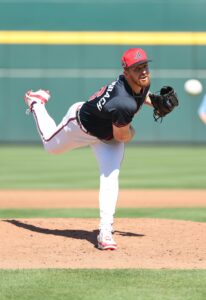The Braves announced this morning that they’ve selected the contract of right-hander Jesse Chavez from Triple-A Gwinnett. He’ll head to the big league roster in place of righty Nathan Wiles, who’s been optioned back to Triple-A after making his MLB debut last night. In order to clear a spot on the 40-man roster for Chavez, Atlanta transferred infielder Nacho Alvarez Jr. to the 60-day injured list. Alvarez has been out all season due to a wrist injury.
The 41-year-old Chavez keeps finding his way back to the Braves. He’s pitched for Atlanta in each of the past five seasons despite signing contracts with the Angels, Cubs, Rangers and White Sox along the way. Most of those were minor league pacts — including his 2025 deal with Texas — and each time Chavez has opted out of a non-roster contract he’s wound up back with Atlanta.
It’s been a successful pairing. Chavez has a 2.56 ERA with the Braves dating back to 2021. He’s pitched in a variety of roles, ranging from long relief to opener to setup man. This is his second stint of the ’25 campaign with Atlanta. He was selected to the roster on March 31, designated for assignment after a two-inning appearance, and quickly re-signed a new minor league deal after electing free agency.
Chavez allowed one run on a pair of hits and a pair of walks in his lone Braves appearance of the season. He’s been outstanding in Gwinnett, firing 6 1/3 innings of one-run ball while setting down 12 of his 25 opponents on strikes (48%). He’s yet to issue a walk. It’s possible he’ll stick around a bit longer with the Braves in this latest stint, particularly given the struggles of veterans Enyel De Los Santos and Rafael Montero through the season’s first month. If the Braves do opt to shuffle him out for a fresh arm, he’d have to again be designated for assignment, at which point a similar process — clear waivers, elect free agency, re-sign — could play out again.
Alvarez, 22, made his big league debut last year but only got into eight games. He’s considered one of the organization’s better prospects after a strong three-year run in the minors that saw him produce a .284/.400/.396 batting line as he climbed the ladder toward MLB. Alvarez exited a game early in spring training after an awkward swing and opened the year on the 10-day IL due to wrist inflammation. The move to the 60-day does not reset his IL clock; he’ll need to be on the injured list for at least 60 days dating back to his original placement. He’ll be out until at least late May.
